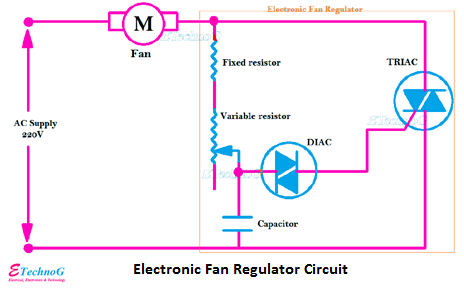Electrical(Old) VS Electronic(New) Fan Regulator
Hey, in this article we are going to discuss everything about the difference between electrical and electronic fan regulators. Electrical and electronic fan regulators are the devices used to control the speed of the electric fan. Electrical and electronic fan regulator works on different principles and their construction and circuit are also completely different. So we will discuss how they work to control the speed of the electric fan.
Speed Control of Electric Fan
Before understanding the workings of the fan regulator, we have to know how the electric fan works and how speed control is possible for the electric fan.
The electric fan is a squirrel cage single-phase induction motor that works on the principle of electromagnetic induction. They are not self-starting, they are capacitor start, and capacitor run the motor.
Anyway, according to the synchronous speed equation and torque equation of the induction motor, the following methods are possible to control the speed of the squirrel cage induction motor,
1. Varying Supply Voltage
The torque of the induction motor is directly proportional to the square of the supply voltage. So if we vary the supply voltage, the speed of the induction motor will change. In fact, both the Electrical and Electronic Fan Regulator uses this voltage-varying method to control the speed of the electric fan( single-phase induction motor).
2. Varying Supply Frequency
3. Changing no. of stator poles
The last two methods are not used for electricity as they are more expensive and complex.
How does the old electrical fan regulator work?
The Electrical Fan Regulator controls the speed of the electric fan by increasing and decreasing the supply voltage or basically, it controls the supply voltage level. A conventional electrical fan regulator nothing but a potentiometer, it has a movable contact on the resistor. When we rotate the knob, the resistance of the circuit increase or decrease according to the direction of the knob rotation. So this resistance drops the supply voltage and applies a variable voltage across the fan motor.
Here you can see the internal diagram of a conventional electrical fan regulator,
How does the modern Electronic Fan Regulator work?
Electronic fan regulators also use the changing supply voltage technique. The electronic fan regulator does not decrease the voltage by creating a voltage drop, it uses the Pulse Width Modulation(PWM) technique to vary the voltage. So you can understand the working principle of the electronic fan regulator easily if you know the concept of Pulse Width Modulation.
Here, you can see the circuit diagram of an electronic fan regulator,
You can see, here the main control is achieved by the combination of TRIAC and DIAC. DIAC is used to provide gate pulse to the TRIAC. And the input of the DIAC is connected to the series combination of Resistor and Capacitor. Actually, all resistors, capacitors, and DIAC are arranged to control the firing angle of the TRIAC. TRIAC only allows the flow of current from the power source to the fan motor when it is triggered by the DIAC. Here the variable resistor or potentiometer is used to control the firing angle of the TRIAC as our wish which further controls the speed of the electric fan.
Differences between Electrical and Electronic Fan Regulators
1. The electrical fan regulator works in the principle of voltage drop by series resistance whereas the electronic fan regulator works in the principle of Pulse Width Modulation(PWM).
2. The electrical fan regulator is very simple in construction, and bigger in size, it has only a resistive circuit whereas the electronic fan regulator has a complex electronic circuit with a semiconductor device, smaller in size.
3. The Electrical Fan regulator wastes electrical energy through the series resistor, but in the electronic fan regulator there is no series resistance, so it does not waste electrical energy. So always purchase an electronic fan regulator it saves electrical energy as well as the electric bill.
4. An Electrical Fan regulator is a low-cost device due to its simple construction but an electronic fan regulator is more expensive due to its complex circuit and compact design.
Read Also:
- Working of modern Led bulb with transformer less power supply.
- [Proper] Ceiling Fan Connection with Regulator, Switch and Capacitor
- Proper UPS Connection with Loads, Inverter, Computer at Home
- [Explained] Connection of Tube Light with Diagram
- Inverter connection diagram. Install Inverter and Battery at Home.



